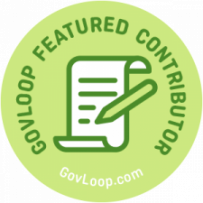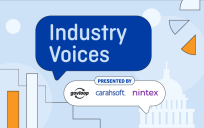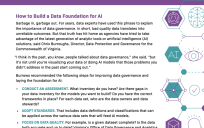 In an ongoing COVID-19 environment, governments are seeking strategies that support swift, targeted and equitable recoveries.
In an ongoing COVID-19 environment, governments are seeking strategies that support swift, targeted and equitable recoveries.
The recent GovLoop blog “4 Types of Data Needed for Effective, Equitable Recovery” explored which specific types of data could help restore fiscal health and revitalize community economies. Understanding data types is the first part of the picture; using proven strategies to mine that data for wins is the second.
There is a slew of technical best practices that help governments get collaborators on the same page to reach accurate solutions sooner in support of effective economic recovery. These include building metrics, automating data pipelines, and using contextual alerting, modeling and spatial analysis. The strongest recovery strategies, however, hinge on the following key principles:
1. Use human intuition.
Human intuition is a key component of data analysis; technology should enable and guide this intuition. Personnel with first-hand experience (subject matter experts) can relate the data to events and identify spikes, bottlenecks and other trends.
The ability to drill down into dashboards and shift contexts empowers users to explore their own questions in a nonlinear way. Government employees or officials should, for example, be able to pivot from a point-in-time metric to an over-time view to examine trends. In short, user experience matters just as much, if not more, than complex data analysis.
2. Collaborate with peers.
The problems inherent in recovery from the pandemic are not unique to a jurisdiction or region. Government leaders are ideally positioned to dialogue with peers and share their own hits and misses to support change that works.
Open data spaces allow for specific departments or entire agencies to benchmark their own data against their peers. This type of benchmarking among a peer group creates a richer context for better insight. With opt-in data networks and standardized datasets, government leaders can make better informed operational decisions.
3. Engage your community.
Numerous studies show data access improves quality of life. For example, publishing data such as restaurant health code violations, crime data or government program evaluations helps the public stay informed, get engaged and make better decisions for themselves.
A quality data experience affects public opinion. People expect government information to be published in an easy-to-understand format that helps them find answers.
Administrative data is important to policymakers and also critical to a range of community stakeholders, such as nonprofits, entrepreneurs, community advocates and other jurisdictions. The best way to share that data is through authoritative, frequently updated datasets on your open data portal. A central, single source of data prevents a patchwork of end-arounds and fragmentation and reduces confusion among stakeholders who must coordinate to be effective.
The strategies above support swift, targeted and equitable recoveries. They shorten the distance between managers and the insights they need to act. What’s key is that insights from the data allow actionable ideas to come up, incubate and scale as they are validated. One win is the first step.
Meredith Trimble is a former municipal official and Town Council Acting Chair, who focused on strategic planning, annual budgeting and bonded infrastructure projects. Her government experience also includes posts in both federal and state-level executive branch agencies: Associate Editor of the U.S. Federal Election Commission’s FEC Record; and Director of Education for the Connecticut Office of State Ethics. In her current role as a Content Manager with Tyler Technologies, Inc., she writes content to help empower those who serve the public. Her current focus is to help facilitate data-enabled organizations as well as to create connections between governments and those they serve.





Leave a Reply
You must be logged in to post a comment.